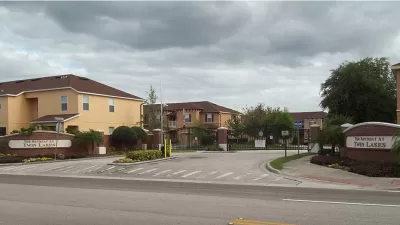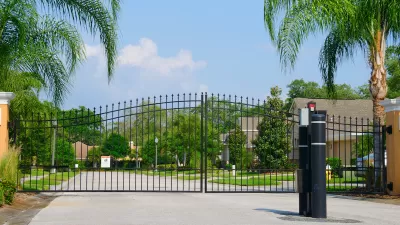Until gated community ownership organizations are held accountable for the actions of their residents and security agents we will see the use of "stand your ground" arguments as veils for deeper racial and socioeconomic profiling.

 Over 9 million Americans live in single-family suburban style residential gated communities. Gating and security-reinforced compounds range from simple boom barriers crossing roads with some form of perimeter fencing to walled security compounds with electronic and motorized patrols. This pattern of settlement protects both year-round and vacation premises and can be found in almost all income categories.
Over 9 million Americans live in single-family suburban style residential gated communities. Gating and security-reinforced compounds range from simple boom barriers crossing roads with some form of perimeter fencing to walled security compounds with electronic and motorized patrols. This pattern of settlement protects both year-round and vacation premises and can be found in almost all income categories.
Gated communities are promoted as providing higher levels of personal protection for property and family. However, what little research there is on this form of settlement suggests that the gates provide little in the way of extra protection. In fact, crime rates in security compounds are controlled more by neighbourhood income class status than by the height of walls or patrols in these fortifications.
What gated communities do, as pointed out by my research and others, is promote fear and extend the notions of property rights well beyond the front door of the homeowner to an external fortress gate. It is this atmosphere of gated fear and separation that led to the senseless confrontation between Trayvon Martin and George Zimmerman. More absurdly, the Florida Stand Your Ground Statute was applied as a rationale for Mr. Zimmerman's presumption of trespass because Martin was in Zimmerman's protectable home ground.
Arguably, if Martin came into the front yard or crossed a property line or even touched a personal vehicle, holding your ground notions might apply. But, Martin had every right to move freely in this community anywhere right up to Zimmerman's front door. So, the idea that Zimmerman had a moral or legal right to assess Martin's movements comes from the pervasive promotion of gated communities as personal security space. In essence, the front gate is the front door. In a sense the continuing propagation of gated communities as personal security zones is leading to deep divides within communities of all incomes and threatening more legally backed vigilantism.
Until gated community ownership organizations are held accountable for the actions of their residents and security agents, we will see the use of “stand your ground” and home security arguments as veils for deeper racial and socioeconomic profiling. When the residents of gated communities can assess who can move on their so-called property, no one who crosses into that territory is safe.
The only way to change this is to extend by state laws the obligation of gated community associations to be liable for the actions of residents or hired agents who act to control the space. In essence, if the gate is the front door, the community associations have to take on the full liability for any actions taken to protect the turf. If this simple legal approach to organizational liability is taken, then gated communities can protect their property as long as they don't violate anyone’s constitutional rights.
The burden of collective property protection has to lay with the collective homeowners association. If homeowner associations take responsibly for all who act to enforce their property in security compounds, the collective homeowners will then have to control who acts for them and how they act. In this scenario, the homeowner association would be held to the same standard as a shopping center owner is for those that guard their properties. And if security enforcers, paid or volunteer, are a liability in gated communities, homeowners associations will have to be well insured, train their agents and control the behaviour of their residents when they perform vigilante roles.
If this legislation passes in every state, all Americans will enjoy genuine "equal protection" everywhere in the nation.
Edward J Blakely is honorary professor of urban policy and the United States Studies Centre at the University of Sydney, Australia. Prior to his Sydney post he held professorships at the University of California, Berkeley and elsewhere. He with Mary Gail Snyder are authors of the prize winning and widely cited book Fortress America: Gated Communities in the United States (Brookings, 2002). Email [email protected]

Manufactured Crisis: Losing the Nation’s Largest Source of Unsubsidized Affordable Housing
Manufactured housing communities have long been an affordable housing option for millions of people living in the U.S., but that affordability is disappearing rapidly. How did we get here?

Americans May Be Stuck — But Why?
Americans are moving a lot less than they once did, and that is a problem. While Yoni Applebaum, in his highly-publicized article Stuck, gets the reasons badly wrong, it's still important to ask: why are we moving so much less than before?

Research Shows More Roads = More Driving
A national study shows, once again, that increasing road supply induces additional vehicle travel, particularly over the long run.

How Protecting Kauaʻi’s Forests Safeguards Fresh Water
A University of Hawaiʻi study shows that protecting Kauaʻi’s native forests from invasive species significantly boosts groundwater recharge, making it a cost-effective strategy to secure fresh water and enhance climate resilience.

Gary, Indiana to Expand Transit Service, Bike Share
The city plans to launch a bike share system in April and expand service on its bus routes.

Pittsburgh Rolls Out Electric School Buses
Pittsburgh Public Schools has launched its first electric school buses, with plans to fully electrify its fleet over the next 14 months, aiming to create a cleaner, more sustainable transportation system supported by new charging infrastructure.
Urban Design for Planners 1: Software Tools
This six-course series explores essential urban design concepts using open source software and equips planners with the tools they need to participate fully in the urban design process.
Planning for Universal Design
Learn the tools for implementing Universal Design in planning regulations.
City of Moreno Valley
Institute for Housing and Urban Development Studies (IHS)
City of Grandview
Harvard GSD Executive Education
NYU Wagner Graduate School of Public Service
City of Cambridge, Maryland
Newport County Development Council: Connect Greater Newport



























